This bibliography is largely based on the books I have myself and/or know about. Of course
to make a really complete bibliography would be a highly specialistic job, for which I am not qualified.
However, I think the most important editions of works by and about Ilf and Petrov
are presented here.
I have divided the works into three categories: works by Ilf and Petrov,
works
on Ilf and Petrov, a 'mixed zone', and
'Further reading', containing
relatively little-known works of fiction that have influenced Ilf and Petrov. See
also the page on literary relationships.
You can also view a
list of titles of the works of Ilf and Petrov,
which is a
project in development.
Works by Ilf and Petrov
 |
 |
 |
 |
 |
Илья Ильф и Евгений Петров, Собрание сочинений в пяти томах
Вступ. ст. Б. Галанова; Коммент. А. Вуллиса, Б Галанова,
И. Израильской
Москва, ТЕРРА-Книжный клуб, 2003
After the 1961 Soviet edition, several editions of the Collected Works
have appeared. This is the one I own. It is more complete than the 1961
edition, in which, for instance, the Kolokolamsk stories are not included.
However, the text of the two novels is that of the 1961 edition and not the
complete authors' version of Odessky and Feldman (see below).
Each volume contains useful commentary.
At some point, the Ilf and Petrov lover will want to buy an edition of the Collected Works. This one is satisfactory to me.

|

|
Илья Ильф, Евгений Петров, Двенадцать стульев, Золотой теленок
Первый полный вариант романов
Подготовка текста, вступительная статья, комментарии М. Одесского и Д. Фельдмана
МОСКВА, ВАГРИУС, 2000
Both editions contain the authors' version of the novels. Variations from the
standard versions (of, for instance, the 1961 Complete Works) are indicated by
italics.
Both books have an excellent foreword, in which the publication history and
the reception of the novels are placed in a political context. Some myths,
based on reminiscences of several authors (including Petrov), are dismantled.
Very important, highly recommended.
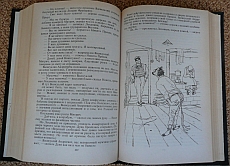
И. Ильф, Е. Петров, Двенадцать стульев, Золотой теленок
Иллюстрации Кукрыниксы
Тольятти, ПМКФ «Лада-Маком», 1993
This is my very first Ilf and Petrov edition and it therefore has some sentimental value for me. I rather like the pictures, part of which can be viewed here.
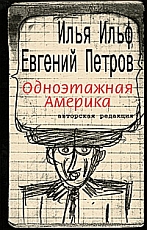
Илья Ильф, Евгений Петров, Одноэтажная Америка
Москва, Текст, 2010
Including Ilf's photographs and letters to his wife.
Foreword, commentary and editing by
Aleksandra Ilf.
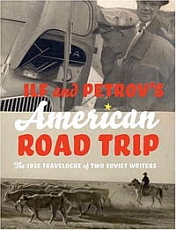
Ilf and Petrov's American Road Trip
The 1935 Travelogue of Two Soviet Writers
Edited by Erika Wolf
with texts by Aleksandr Rodchenko and Aleksandra Ilf
translated by Anne O. Fisher
This is the translation of Американские фотографии, the serials that
was published by Ogonyok not long after Ilf and Petrov's return to
Russia. This edition contains even more of Ilf's photos, the photo quality is
somewhat better than that of the Russian edition mentioned above. Generally,
this is a beautiful, luxurious edition.
Especially interesting is Aleksandr Rodchenko's article from Sovyetskoye foto,
1936. Rodchenko, a well-known constructivistic photograher and designer,
criticized Ilf's photography, which he considered to be rather amateuristic,
but 'a good start'. The photos may, artistically speaking, not be on a high
professional level, but for documentary aims, and as illustration to the
text, they are, in my view, marvellous.
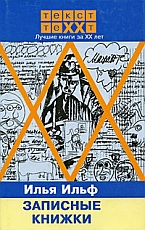
Илья Ильф, Записные книжки
Москва, Текст, 2008
There are several editions, old and new, of the Записные книжки. This
may be the most 'accessible' one. Repetitions have been omitted, the
'literary' notes have been selected. Foreword, commentary and editing by
Aleksandra Ilf.
Mixed zone
Books belonging to both categories.
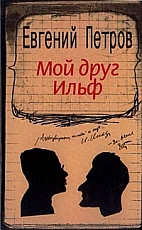
Евгений Петров, Мой друг Ильф
Составление и комментарии А.И. Ильф
Москва, Текст, 2001
Of all the works that have been published by the Moscow publishing company Tekst,
with Aleksandra Ilf, who cannot be praised enough for her work
to preserve the literary heritance of her father and his co-author and friend,
this is probably the one I like best.
The basis of this book is formed by three plans drawn up by Yevgeny Petrov for
a book about Ilf. Petrov's notes for this book are, as it were, filled in
by Aleksandra Ilf with texts from Ilf and Petrov themselves and author
authors who have written reminiscences about Ilf, including Bulgakov, Valentin
Katayev, Olesha and Ehrenburg.
Then there are some interesting extras, such as a very touching fragment by
Ilf's wife about his death and some official letters from 1948 which led to
a publishing stop of Ilf and Petrov's works, which lasted until 1956.
And last but not least, the book contains a large number of pictures: photographs,
drawings, reproductions of paintings, facsimiles of book editions and newspapers.
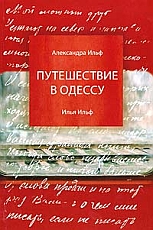
Александра Ильф, Илья Ильф, Путешествие в Одессу
ПЛАСКЕ, 2004
This book consists of two parts. In the first part, Ilf's daughter Aleksandra
describes her father's life in Odessa, before his move to Moscow. Ilf before
Petrov, so to say. There are letters, fragments from reminiscences by others,
pictures. The second part consists of a number of Ilf's stories - Ilf without
Petrov, both from the time before they met and from the time of their co-authorship.
The edition is beautiful, on high-quality paper, though I find the lay-out a
bit chaotic. The reproduction of the photographs is also very good. Some of them
are well-known, but others you will probably see for the first time.
A work of love.
Works about Ilf and Petrov
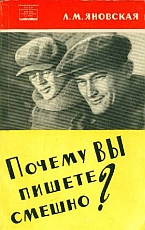
Л. М. ЯНОВСКАЯ, Почему вы пишете смешно?
Об И. Ильфе и Е. Петрове,
их жизни и их юморе
НАУКА, Москва 1969
The first comprehensive monography on the work of Ilf and Petrov. It is obviously coloured by the restrictions of Soviet times and in 1969 the author could not tell everything which she maybe would have wanted to tell. it is useful as a starting point for readers who want to know some background.
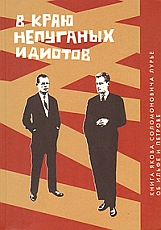
Я.С. Лурье, В краю непуганных идиотов
Европейский Университет в Санкт-Петербурге, 2005
This book was originally published in 1983 in Paris under the name of A.A. Kurdyumov. It must have been the first book in which the life and work of Ilf and Petrov are treated without any considerations of censorship or self-censorship. The author treats the work of Ilf and Petrov in social and political context, focussing on their attitude to the 'intelligentsia' of their days, and defending them against 'liberal' accusations by Arkady Belinkov and Nadezhda Mandelstam of mocking the intelligentsia. For me the book was an eye-opener. Highly recommended.
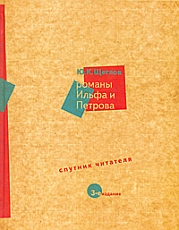
Ю. К. Щеглов, Романы Ильфа и Петрова. Спутник читателя
Издательство Ивана Лимбаха, 2009
To say that this is a remarkable book would be an understatement.
It is the revised version of an earlier work, so be sure to buy this one, the
latest and last, because the author sadly passed away in 2009.
The book has more than 600 large pages of introduction and commentary to the
two novels. The novels themselves are not included. The commentary is of a
very diverse nature. Abbreviations are clarified, Soviet institutions are
explained, biographical background to real characters is given (Бриан - это
голова). My favourite comments are those in which the writer describes what life
was really like in those years, based on newspapers, contemporary
novels and stories and, very interestingly, a few books by foreigners who
travelled in the Soviet-Union. And there are also purely literary comments:
motifs are placed in traditions from both Russian and Western literature,
allusions are explained. The extent to which Ilf and Petrov wrote in a
tradition was eye-opening to me; in this connection the names of Arkadi
Averchenko and Teffi, both belonging to the pre-revolutionary 'Satirikon' group
of writers, come up especially often.
Let me give one example of 'intertextuality' as given by Mr Schcheglov. In Chapter
19 of Двенадать стульев, called 'Уважайте матрацы, граждане!', there are
several obvious allusions to Lev Tolstoy. He is mentioned explicitly in connection
with his vegetarianism. (Лев Толстой, - сказал Коля дрожащим голосом, -
тоже не ел мяса. Etcetera. An extremely funny dialogue.) And then, at the end
of the chapter:
- Хорошо же, хорошо. Я сама знаю, что мне делать.
И Лиза, краснея, купила у торговки бутерброд с вареной
колбасой.
If you recognized the reference to Anna's suicide in Anna Karenina, good
for you. I didn't, even though I have read Tolstoy's masterpiece three times, once
in Dutch and twice in Russian.
There are moments when Schcheglov goes very, very far, when he points to vague
similarities with earlier works, which seem not too interesting to me, because
the vagueness makes it a bit arbitrary. One example: Chapter 8 of Двенадать стульев,
'Cоюз меча и орала', begins like this:
Когда женщина стареет, с ней могут произойти многие
неприятности - ...
Schcheglov writes about this paragraph:
"Пассаж выдержан в духе отступлений классического романа; ср. хотя бы у Бальзака
сравнение чар девушки и зрелой женщины или лиха женщины в молодом и пожилом
возрасте [Тридцатилетняя женщина, гл. 3 и 6]." So what, I am inclined to say.
In this book the author displays an erudition which is really astounding,
bordering on the unbelievable. His sources are sometimes extremely obscure. The
Bibliography consists of more than 14 pages, and that does not even include
all newspapers and journals he has consulted. Incredible.
The book starts with an Introduction of almost 70 pages, which is sometimes a
bit too academical for me, but contains a lot of interesting stuff as well. For
instance, I found enlightening the distinction between the 'two different Benders',
the 'rogue' that dominates in The Twelve Chairs (similar to e.g.
Jaroslav Hasek's Good Soldier Svejk) and the 'demon', as
Schcheglov calls it, of The Golden Calf, who shows similarities with
characters like Voland from Bulgakov's The Master and Margarita.
All in all, I can heartily recommend this amazing book. Even if you may not find
everything equally interesting, there is bound to be something for every real Ilf and
Petrov lover.
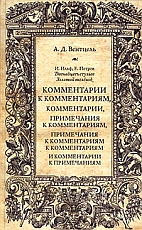
А. Д. Венцель, И. Ильф, Е. Петров "Двенадцать стульев", "Золотой теленок". Комментарии к комментариям, комментарии, примечания к комментариям, примечания к комментариям к комментариям и комментарии к примечаниям
Новое литературное обозрение, 2005
This is the only book on this page which I do not own and have not read. I have
included it because of its remarkable title, which is certainly one of the
longest book titles ever, if not the longest, and because, judging by its
description, it seems to be interesting. It is
a kind of response to Schcheglov's book and in fact Schcheglov has incorporated
some of Mr Ventzel's comments in the last edition of his book. As I have not
read it, I will copy the publishor's recommendation from an online bookstore's site:
Импульсом
к написанию
этой книги
послужили
комментарии
Ю.Щеглова к
«Двенадцати
стульям» и
«Золотому
теленку»
Ильфа и
Петрова.
Нужно ли для
того, чтобы
что-то свое
сказать об
Ильфе и
Петрове, быть
членом
корпорации
профессионалов,
говорить на
их тайном языке
и смотреть на
мир их
серьезными и
пристальными
глазами — или
достаточно
иметь навыки
наблюдения и
логической
организации
материала,
хорошо знать
романы Ильфа и
Петрова,
любить их и
стараться
писать не слишком
скучно? Автор
дает
комментарии
к тем местам
у Ильфа и
Петрова, мимо
которых проходит
Ю.Щеглов,
иногда
спорит с ним
и тогда пишет
комментарии
к
комментариям.
В то же время
он пишет о
том, чем были
романы Ильфа
и Петрова и
вещи,
затрагиваемые
ими, для него лично
и как они
вплетались в
ткань эпохи —
опять-таки в
его личном
восприятии.
Подчас то,
что пишет
автор, имеет
лишь опосредованную
связь с
«дилогией» — но,
в конце концов,
некоторая
широта не
противопоказана
научному
исследованию,
да и
читатель,
может быть,
не будет
возражать.
Further reading
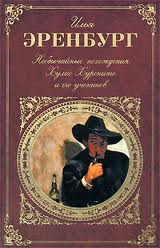
Илья Эренбург, Необычайные похождения Хулио Хуренито и его учеников
Эксмо, 2008
Хулио Хуренито was published in 1922. It is impossible to read it without
thinking of Ostap Bender. There is no doubt that Ilf and Petrov read it, so
it is safe to say that it in some way influenced them. At the same time, though
the novel is certainly enjoyable, it is not for nothing that it is all but forgotten
now, in any case compared to Ilf and Petrov's novels. The characters are a bit
colourless, the story is going in all directions.
This edition contains a few other stories by Ehrenburg. Regrettably there is
a rather large number of typographical errors.
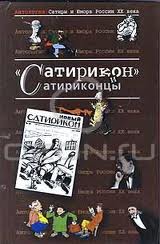
Антология Сатиры и Юмора России XX века. Том 3. "Сатирикон" и сатириконцы
Эксмо, 2006
A collection of columns, stories and poems from the magazines Satirikon and Novy Satirikon, which existed more or less till the Revolution and was revived in Paris for a short period in 1931. Here you can find more information about this magazine. The book contains works by writers such as Averchenko and Teffi, and poems by Mandelstam en Gumilyov among many others. Ilf and Petrov clearly continued the tradition of Satirikon, both in their style and in their subject matter.

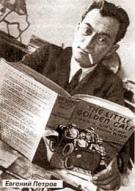
Document history of this page:
First online - 18/11/2010
Last minor corrections - 6/12/2010
Last major corrections - 23/12/2010 (a section and two books added); 10/1/2011 (link to list of works added)